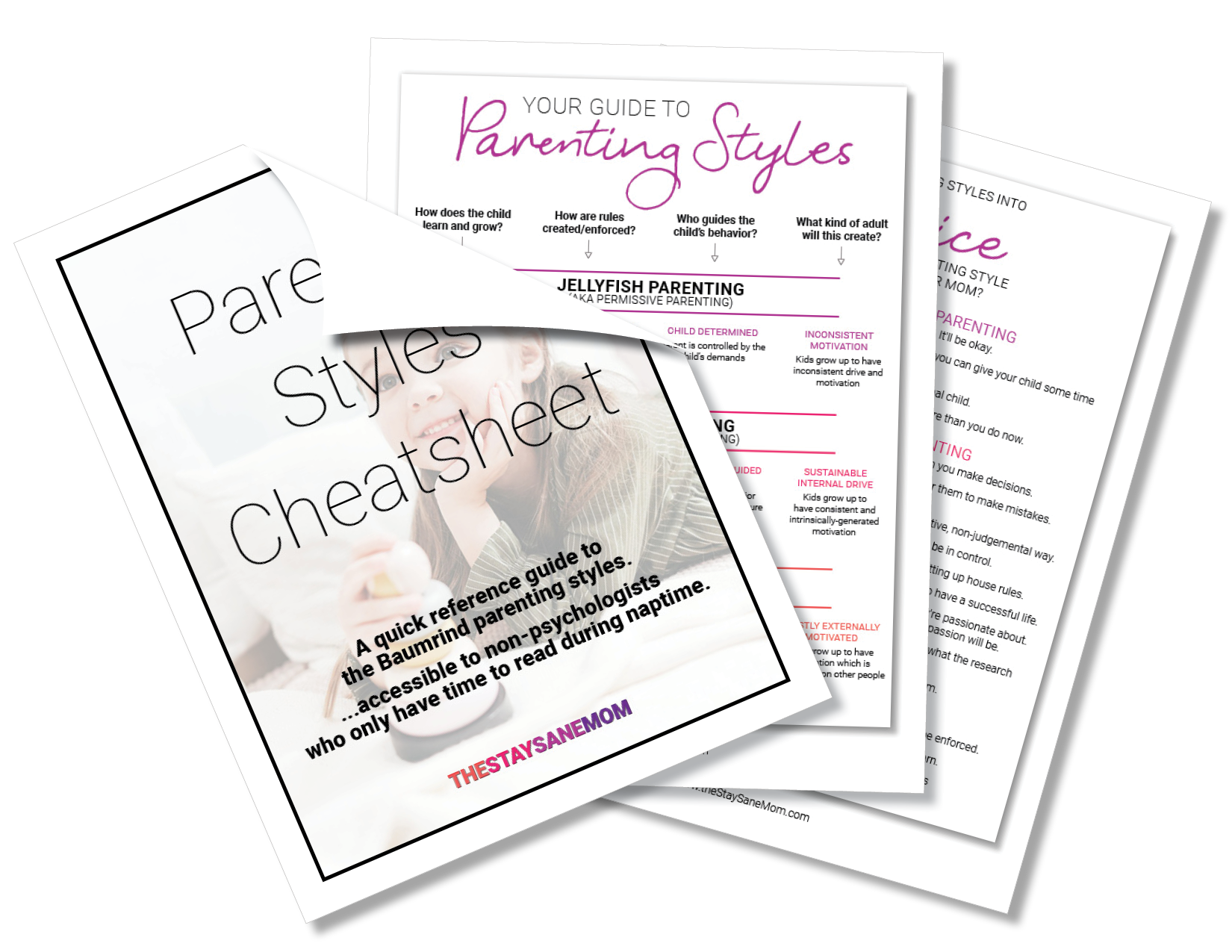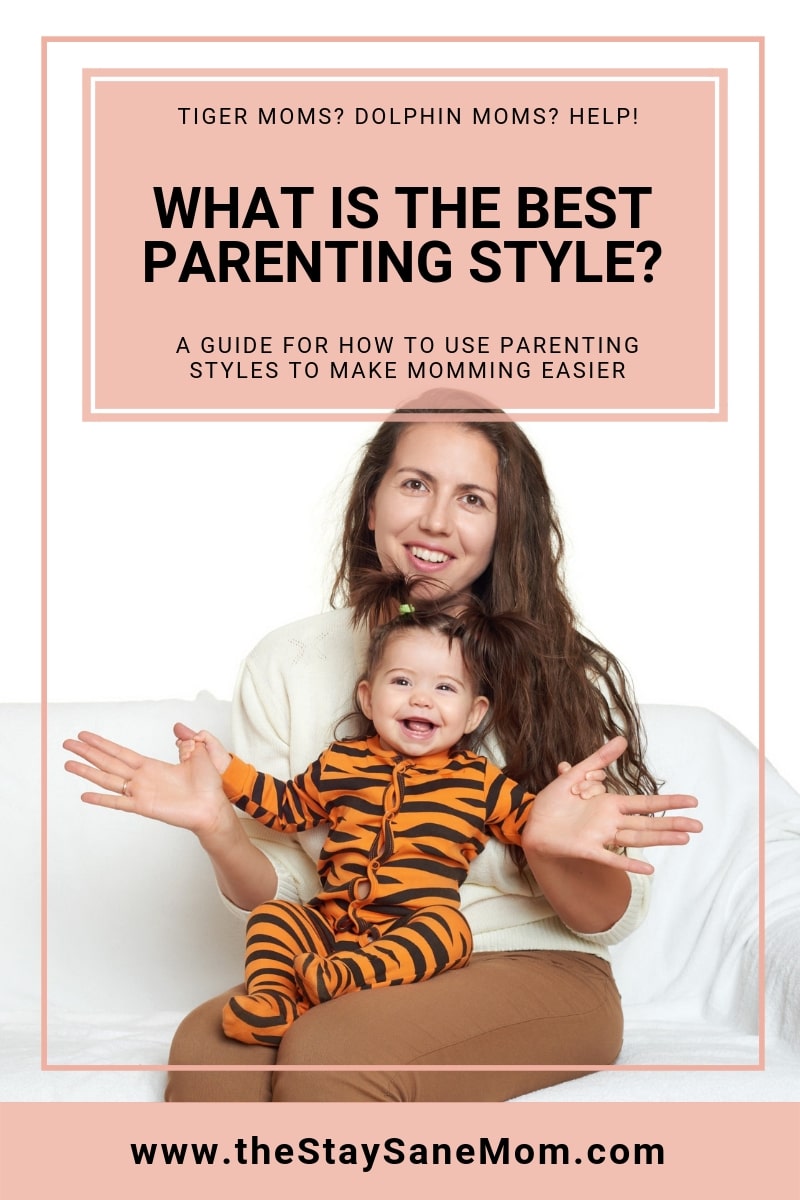Which Parenting Style is Best?

Which Parenting Style is Best?
You've probably heard about Tiger moms or permissive parenting, but why does it matter? Here's everything you need to know about the basic parenting styles and why they matter for you and your kid.
Written by Liz Bayardelle, PhD | See Comments | Updated 10/15/2018
Want to cut to the chase?
Parenting Styles Cheatsheet

Want to cut to the chase?
Parenting Styles Cheatsheet
Get the Free Printable Cheatsheet Now
Get it NowWhich Parenting Style is Best?
This post contains some affiliate links for your convenience. Click here to read my full disclosure policy.
Spoiler Alert (and TL;DR Summary)
Now, if you want a more detailed explanation of the parenting styles, their pros and cons, and how you can use each one to make you a better parent, continue on...
Parenting Styles: A Two-Paragraph History
- Permissive Parenting (think of the parents with tyrannical children you pity in WalMart)
- Authoritative Parenting (think of the mannerisms of kindergarten teachers with the patience of Job)
- Authoritarian Parenting (think overbearing, helicopter moms)
This initial research was later expanded (Maccoby & Martin, 1983), splitting permissive parents into two categories:
- Indulgent Parents (the WalMart parents who just buy Junior 19,051 toys to make them shut up)
- Neglectful/Uninvolved Parents (the WalMart parents who don't seem to notice that Junior just upended an entire display of soup cans)
Present-Day Parenting Styles
We'll get into all that later, but first I want to go over some new developments in the way of fun category names.
I'm sure everyone heard the buzz about "Tiger Moms" in Amy Chua's 2011 book, Battle Hymn of the Tiger Mother. This "Tiger Mom" is the epitome of Baumrind's authoritarian parenting.
Then, in 2014, neuroscientist Dr. Shimi Kang, came out with her book The Dolphin Way, which describes "Dolphin Mom" parenting as an alternative to the "Tiger Mom". The dolphin-style parenting she describes is the personification of Baumrind's authoritative parenting. She also brings up a category of "Jellyfish Parents" as a representation of Baumrind's permissive parents.
Since this only represented three out of four categories, I'm hereby coining the term "Cat Parenting" (patent pending) as an animal name for Baumrind's uninvolved or aloof parents.
Now let me explain, before all you mothers of actual cats get all up in arms. This is based solely on my experience with cats, not in any actual "cat facts".
Maybe it's that I smell perpetually like my two, large dogs, but every cat I've ever met has been very "meh" about my existence. If I had food or something to offer them they would tolerate my presence, but if I didn't they simply existed around me without any real attention paid my direction, positive or negative. This is, in my opinion, a pretty spot-on metaphor for uninvolved parents.
A Handy-Dandy Illustration of Parenting Styles
- Is the parenting demanding or permissive?
- Is the parent nurturing or unresponsive?
If a parenting is both nurturing and demanding, they qualify as a "Dolphin Parent" (aka an authoritative parent).
If they're demanding, but not nurturing (that is, they're unresponsive to the child's needs) they're a "Tiger Mom" (aka an authoritarian parent).
And so on and so forth. Here's the pretty chart I promised...
So, now that you've gotten the basic gist for the structure of each parenting style, we get to the important part.
Why Should I Care?
Simple enough. But before I show you exactly how each of these parenting styles plays out, there's another reason it's super important to know about parenting styles: we all have a little of each of these parenting styles in us.
It's not like "Oh, I'm 100% "Dolphin Mom" (authoritative) so my kid's going to grow up to be a neurosurgeon. Watch me parent, peasants." No, no, no, no...
Every one of us has "Cat Parent"* moments when we're too tired to prevent our toddler from ransacking the tupperware drawer for the seventh time in a row so we just let her play while we finally finish folding that load of laundry, pledging to clean it up later.
Every one of us has "Jellyfish Mom" moments when we said only one lollipop, but the little critter looks up at us with such big eyes and actually says please unprompted (for a friggen change) and we give in "just this one time".
Try to find when you're most susceptible to each parenting style and how to put on each "parenting style hat" when it's needed. You'll always be a mix of all four, but you can use this knowledge to shape your behavior and whip out each mode at the right time.
So here we go. Parenting styles.
Cat Parenting* (aka Unresponsive Parenting)
Now's the time for some real talk: everyone has cat* parenting moments. I've definitely let my little noodle watch 20 more minutes of YouTube on my phone so I could get just a smidgen more work done.
I'm guessing there's at least one occasion where you've heard the dreaded "oh God, it's too quiet, I know something truly terrifying is going on in the next room" silence that every parent has learned to fear...and yet you kept doing what you were doing for a few more minutes because it felt so darn good to actually get to be a two-handed adult for a bit.
We're all unresponsive, "Cat Parents"* every once in a while. Being completely responsive 100% of the time would be unattainably exhausting.
However, here's a list of the long-term ramifications kids suffer when their parents are persistent and extensively unresponsive in their parenting:
- Depression and difficulty to form a bond with others
- Impulse control and poor emotional self-regulation
- Failure in relationships
- Anger, hostility, delinquency, addictions, mental issues, and social isolation
Now, if you're reading a parenting blog (hint: you are) you are most likely not completely unresponsive in your parenting.
*high five*
However, take this hellish crazy list to heart and make sure you don't tune out at moments when your little one really needs attention. If you need a break, try planning some "mutually unresponsive" time into your schedule. This is time where your kid is happily engaged in their own little world (which in my house usually involves special time in a very large cardboard box, because...well...kids really love boxes) and in a location where there's nothing that could be dangerous. Once you've done this safety check, you can be a person instead of a parent for a few minutes, collect your thoughts (or cry in the closet), and come back a happier, refreshed, and more present parent.
Jellyfish Parenting (aka Permissive Parenting)
We've all got a little "Jellyfish Mom" in us. Your baby isn't going to sleep so you decide to nurse it to sleep instead of making it fall asleep on it's own. Your teenager has a bad grade that should keep them grounded at home, but they've been planning to go to the football game with their friends all week so you let them go anyway.
"Jellyfish Parenting", in excess, has been shown to have some pretty negative consequences for your kiddo. This includes behavioral issues and negative personality traits most of us want to avoid like the plague:
- Having a hard time with self-control
- Difficulty with emotional regulation
- Difficulty with following rules
- Egocentrism, selfishness, and antisocial behavior
- Rebellion and defiance
- Relationship difficulties and problems with social interactions
- Quitting when they come up against a task that challenges them
So, yeah, that's a hard nope.
Despite the problems of this hellish list of "Jellyfish Parenting" induced issues, there's nothing wrong with incidents of "Jellyfish Parenting". Every once in a while. In moderation.
Here are my guidelines (based on a little research and a lot of personal experience) for some occasions where it's perfectly okay to be a "Jellyfish Parent" for a few minutes:
- In small amounts, particularly at the end of long days
- After stressful events or extreme bouts of "Tiger Mom" interactions
- When the kid isn't feeling well (who among us isn't a "Jellyfish Mom" when the little one is sick?)
Tiger Parenting (aka Authoritarian Parenting)
(Personal Marriage Sidenote: Surprisingly enough, this difference in perspective is why we parent really well together. If our kids had two of me for parents they'd be trilingual and better-disciplined than most Marines but wouldn't understand what the word "fun" meant if you used it in a sentence; if they had two of him for parents they'd be spoiled rotten but in incredibly good shape from all the time they'd spend playing sports in the park. Balance, ladies and gents, not just for your scale...)
The basic definition of a "Tiger Mom" is one who has incredibly high standards and demands for their kids. While this doesn't sound that bad, to be a true "Tiger Mom" or authoritarian parent, one has to demand blind compliance from their kids. You adhere to the high standards not because they want the growth that comes from a challenge (or even because they want the rewards or accolades that come with attainment), but because the parent said so.
This parent-directed approach is compounded by strict discipline and punishment. This one-size-fits-all approach also doesn't come with any particular responsivity to the child's needs. The parent decides the course and the kid has to follow it or face the consequences.
Some parts of "Tiger Momming" (in moderation) can give good discipline and bestow a sense of priorities. However, "Tiger Momming" in excess can have some pretty negative consequences for the kiddos:
- Lower self-esteem, higher insecurity, and less happy
- Less independent and poorer social skills
- Behavioral problems and/or mental issues
- (Ironically) occasionally causes worse academic performance
Dolphin Parenting (aka Authoritative Parenting)
Although I'll be the first to admit that "Dolphin Parenting" sounds a bit like you should be wearing a tie-dyed skirt and a flowered headdress while you and your child skip through a field somewhere, the authoritative parenting style (i.e. dolphin parenting) has a long history of research backing it up as the parenting style that creates the best, most well-rounded kids.
Kids that are raised by "Dolphin Moms" are happier, more independent, have better self-esteem, mental health, and social skills, have fewer mental health issues (e.g. anxiety, depression, drug use, etc.), and have better results in the academic realm to boot.
So, if you're asking yourself "how can I be a better parent?", here's the scoop on how to strike that balance between the authority and demands of a "Tiger Mom" and the child-centered attention of a "Jellyfish Mom":
- Look at parenting as a collaboration between you and your kid. Yes, have expectations, goals, and demands, but focus on their needs and individual personality as you push and encourage them.
- Similarly, allow your kids to have input in how their raised. Let them help create the rules system you're going to enforce. Let them "pick" (with guidance) their chores. The more input your kid has in the process, the more invested they'll be in the results.
- Don't overwhelm your kid. There is such a thing as too many extracurriculars, too much instruction, too much maternal protection. Let your kid explore. Let them make mistakes. Let them guide their own schedules (at least some of the time).
- Seriously though, let your kid make mistakes. Let them fall down. Let them lose a soccer game. Then help them pick up the pieces, dissect what went wrong, and learn from the experience.
- Don't parent in a vacuum. Use whatever social support network you have (friends, family, teachers, community events, etc.) to create balance, develop social skills, and allow your children to develop bonds with more than just you.
- Adapt to different situations. What might be right for one of your kids could be the exact worst thing to do with their younger siblings. Each kid and each situation, is unique, so don't expect there to be one correct "formula" that guides all of your parenting decisions.
Where to Go From Here?
Ponder this information for a while as you go through your normal routine. Try to look for opportunities to try out "Dolphin" techniques. Consciously take not of when you tend to resort to "Jellyfish" or "Cat" strategies, and double check if you're doing so in moderation or a little too much.
Above all, be authentic about it. If something feels wrong, it probably is. No one talking to you through the internet is ever going to know your kid as well as you will.
Finally, download the attached PDF Parenting Styles Cheetsheet. It's a refresher course on everything we went over here, but it also includes a list of practical ways you can use the best parts of each parenting style to make you a better parent.
------------------
*Please don't quote "Cat Parenting" to your psychology-hip friends. Most people know about "Tiger Moms". Some will have read about Dolphins and Jellyfish. I coined the term "Cat Moms" in the writing of this blog and, while I hope it cat-ches on (lame pun intended), it's not actually a real thing yet.
Start Your Next Step
Parenting Styles Cheatsheet

Get Sanity, Delivered to Your Inbox.
Care to Share?





About the Author

Liz Bayardelle, PhD
Founder | Contributor
Liz (or Dr. Mommy, as her toddler started calling her after learning what a PhD was) is the happily sleep-deprived mom of a toddler (and professional raccoon noise impersonator), a sparkle-clad kidnado, a teenage stepdaughter, 200 cumulative pounds of dog, and herd of dustbunnies (if daily vacuuming doesn't occur). During nights and naptimes, she uses her PhD in business psychology as an author, speaker, and consultant. She also serves as an executive and principal for three companies, two of which she co-founded with her very patient (and equally exhausted) husband.





-Budget.jpg)